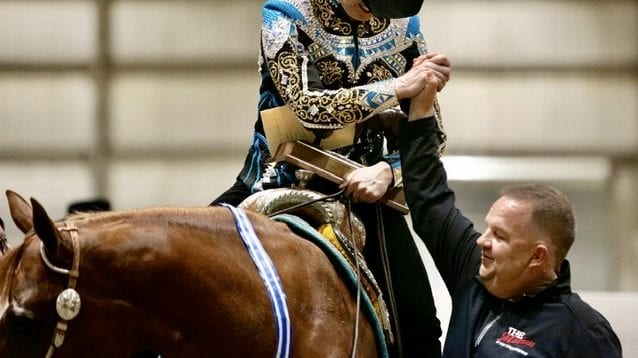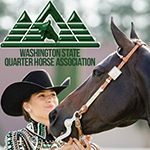A support system can either make or break an exhibitor’s enjoyment of showing. If the system is welcoming, encouraging, and positive, everyone benefits. If there is negative tension between an exhibitor and their barn mates, things become more complicated for the entire team. It is crucial to address these problems at the first sign rather than letting the tension grow.
Addressing tension early on saves heartache and anger down the road. Sometimes the only way an individual can escape the drama is by finding a new support system. This can be a challenging change in the beginning, but it will be worth it.
How does one recognize when it is time for a new support system? What are the major red flags? We talked to exhibitors, Taylor Wheaton, who competes on the AQHA circuit and Gabby DAgostini, who is an Appaloosa trainer at Beck Farms located in Lodi, California, about their thoughts on this topic.
Exclusion from the group
Do you feel excluded from the rest of the group? Do your “show friends” not invite you to gatherings? Or do they simply not speak to you anymore? These are all signs that something is wrong in your system.
Taylor Wheaton, 2019 Congress Novice Amateur Showmanship Champion, comments, “A major sign is starting to feel like an outsider to the group. For example, feeling like others are talking behind your back or singling you out of activities.”
It is essential to recognize these signs rather than brushing them to the side. If leaving someone out of the group becomes a habit, there is a disconnect with communication. Start the conversation, talk about how you feel, and see what solutions can be proposed.
An exhibitor should not have to beg to be a part of the group or change who they are to feel welcomed. Efforts must be put in from both sides of the friendship. Wheaton adds, “You may feel like you’re putting in all of the work to make the friendship last. For example, if you always speak first and otherwise, they will not even speak to you.”
Lack of encouragement
Encouraging one another is a fundamental aspect of a supportive team. Teammates and friends are there to support, inspire, and celebrate one another. If that lack of encouragement is evident in the system, it is time to find a new group.
Everyone has a bad day now and then. If there is an isolated incident where a barn mate or friend was not very encouraging, don’t think much about it. The real problems arise when negativity becomes a repeated pattern.
DAgostini adds, “Horse showing should be fun and exciting. Feedback doesn’t have to be conveyed in a negative focused manner. Positive affirmation can be so helpful!” Positive affirmation and encouragement can make a world of difference to a friend.
Finding inspiration from a support system is another key to achieving goals. DAgostini sums it up perfectly, “You need to find a new support group if you have lost inspiration or passion. Surround yourself with positive, passionate people who make you hungry for success.”
Competitive spirit turns toxic
Horse showing can be political, cutthroat, and unapologetic. The sport is competitive and can drive a wedge between preexisting friendships. Healthy competition is welcomed and good for overall morale. However, the environment can quickly turn toxic if mishandled.
These are critical distinguishing signs between healthy and unhealthy competition between friends or teammates:
Healthy:
- Sharing a mutual appreciation of the journey, not only focusing on the end goal
- Cheering on and congratulating friends even after a severe loss
- Recognizing someone else’s improvements, no matter the placings
Unhealthy:
- Snarky comments or an abrasive attitude after a loss
- Constantly comparing abilities and accolades to everyone else
- A “winning at all costs” mentality
DAgostini gives an excellent example of a healthy competitive spirit, “It is important to ride with others who can point out what you are excelling at, as well as what you can improve upon. That support can only better you as a rider.”
Awkward tension
When relationships in the barn become strained, awkward tension arises. These strange vibes are uncomfortable for the exhibitor, the other person, and the rest of the team.
Addressing the tension before allowing it to “snowball” will help make the barn’s environment more welcoming. Invite the other person to grab a coffee, or just simply step outside to have a word. Do not be afraid to be the one to start the conversation. The hardest part is beginning the dialogue.
If the situation is something that cannot be talked through and worked on, it is time to find a new support system. Awkwardness is uncomfortable and certainly not conducive to an enjoyable horse showing experience.
Go with your gut
The saying “go with your gut” is extremely helpful in these challenging situations. No matter politics or drama, an exhibitor needs to do what is right for them. Horse showing is all about having fun while working hard.
An equestrian should feel comfortable, inspired, and positive around their support system. To unlock one’s full potential, they need a group of loyal friends behind them through the journey. When an equestrian indeed “finds their tribe,” they will know it in their gut.
Wheaton concludes, “You may get a feeling in your gut that something isn’t right. That is your intuition when you’re around the group – do not ignore it.”
****
The keyword in support system is support. The group of people on a barn’s team has a direct impact on the overall showing experience. They can either build one another up or tear each other down. The key is to know when to cut ties with toxicity. Allowing the negativity to grow hurts more people than when the red flags are addressed immediately.
As American songwriter and singer Stevie Nicks once said, “You can’t be your best self until you find your tribe.”









